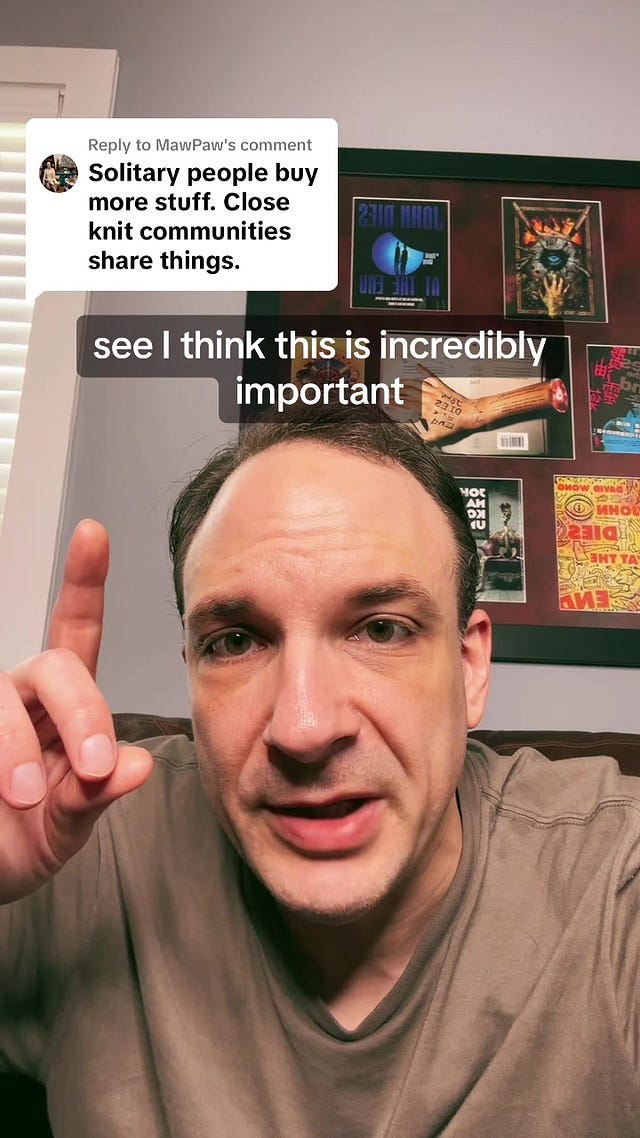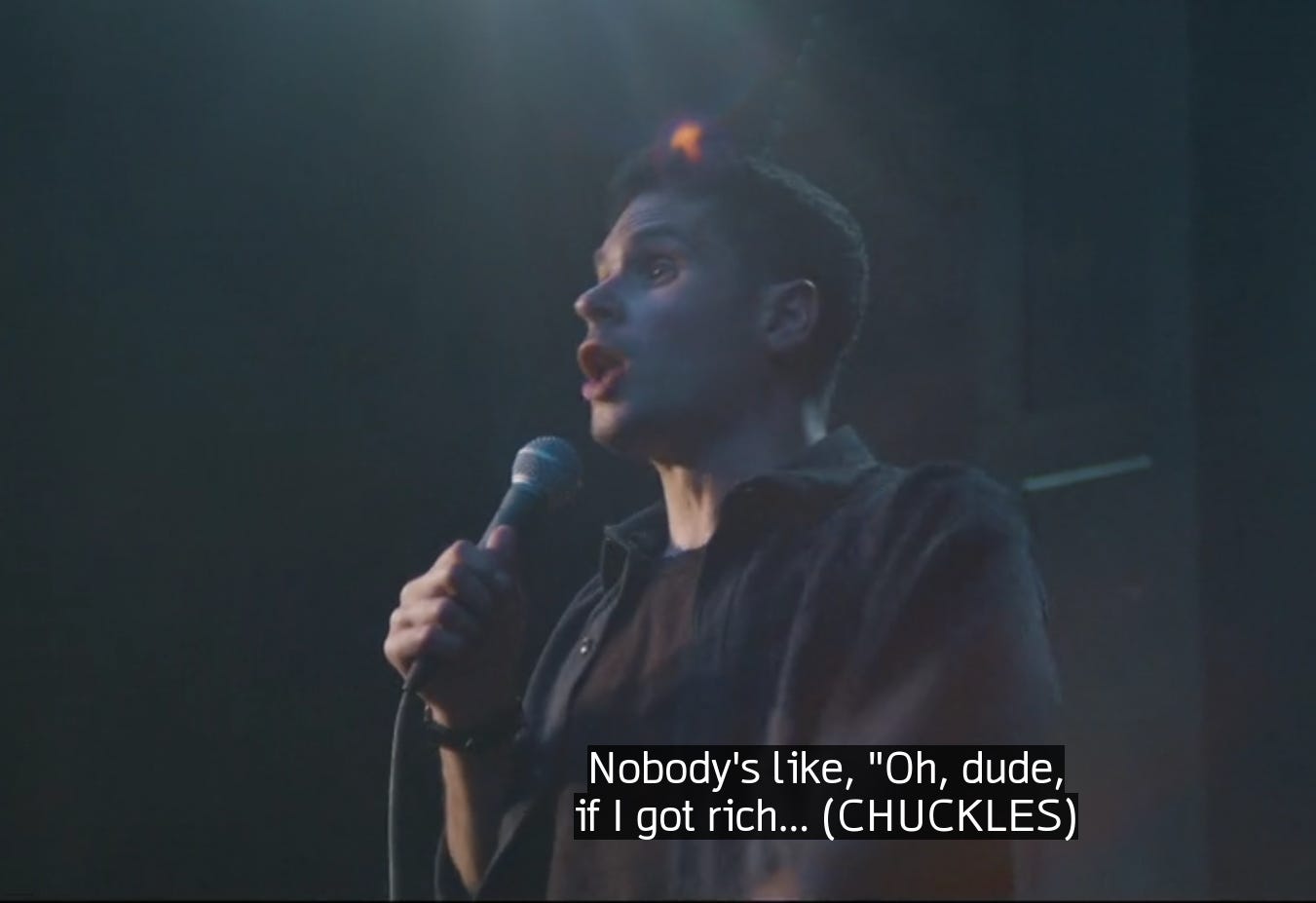No Third Place? No Accident.
Our Society Would Rather Give You a Digital Replica of Yourself to Talk to Than a Park
(source)
Back again after two weeks. Needed the break. I will try my best to keep to the Saturday publishing schedule. How was my week off? I relapsed on drugs after 12 years clean. I am going to meetings every day now for 90 days because that’s what was suggested to me. I like meetings. Growing to love them again. So much love, so much togetherness. Great during a loneliness epidemic.
I bring this up not to go in some new, lyrical essay direction. I mean to say that it took a jarring, devastating, extreme experience for me to find a third place. The Deep Dive delivered an excellent video from Elliot Sang on the loss of third places.
While he does look at capitalism’s part in the decline of third places, his focus is primarily on how adults don’t like seeing youths gather in public, so the youth have nowhere to go. My aim here isn’t to say that capitalism is the cause of the decline of third places. What does need to be looked at, though, is how, unlike many of capitalism’s ills, this one is not a byproduct. It is capitalism’s intention to reduce, if not eliminate, places that are not either homes or businesses. Tech is simply the latest battering ram in this case.
Third places are valuable for civic life, for building communities. They have been for centuries. From France’s cafes to Vienna’s coffeehouses, many ideas and relationships were formed in these places. But that’s just it: capitalism needs us lonely. The lonelier you are, the more stuff you buy. The less you share.
 Tiktok failed to load.
Tiktok failed to load.Enable 3rd party cookies or use another browser
In the TikTok above, Jason Pargin discusses how a business like Uber wouldn’t be needed if we lived in a tight-knit community of family and friends who gave us rides. Pargin goes on to discuss how the counterargument is that relying on a friend for a ride is unfair. He says this is the crux of our issue, our social dilemma. Yes it is an inconvenience, but it is preferable to being alone and not needed.
Or, as Drew Michael says in his criminally underappreciated special from last year, the point of being rich is to have less people around you.
The remaining third places there are have become less about helping you meet people and more about helping you meet analytics projections on Instagram and TikTok. That picture of you and your friend at karaoke got two likes and one angry comment from your friend’s ex-wife? Back to the drawing board.
From Realism Confidence:
Fandoms and the extremes of parasocial attachment could be considered compulsive coping mechanisms for the collective detachment we feel from one another
Of course, like many things, third places have moved from IRL to the online realm. Elon Musk calling Twitter the public square underlines this point. Beyond the third place now becoming gamified with likes, etc., the question also becomes why are we here? Third places are now churches of celebrity/IP worship. Parasocial is as deep as it gets. And it is also the main common point for us plebes on social. “Oh you like Olivia Rodrigo? Me too!”
This is, of course, assuming Twitter is still around. MySpace was once the town square. Now it is underwater. Facebook was the public square. Now it is where old people publicly grieve about their increasingly dwindling group of friends.
What will replace Twitter? How about you? No one gets you like you do right? I am not talking about self care btw (although this is an increasingly growing racket market on social). I mean an AI-generated clone that uses your writing and images as its learning set. There are purported to be therapeutic benefits to this. As if tech needs to move more into the therapy sector.
Christoher Lasch in The Culture of Narcissism:
Even when therapists speak of the need for “meaning” and “love,” they define love and meaning simply as the fulfillment of the patient’s emotional requirements. It hardly occurs to them—nor is there any reason why it should, given the nature of the therapeutic enterprise—to encourage the subject to subordinate his needs and interests to those of others, to someone or some cause or tradition outside himself.
Some of the greatest joys in life are when you lose yourself in a crowd, or what Emile Durkheim called collective effervescence. And it is not like capitalism completely fails to see the purpose of a third place where people can gather and form communities. But these third places are becoming more and more expensive and cater exclusively to the upper crust. Look at the ever-growing experience economy. Jenny O’Dell in Saving Time says “the experience economy expands to include commodified notions of things like slowness, community, authenticity, and “nature”—all while income inequality yawns wider and the signs of climate change intensify.”
One example of an experience that became commodified: Burning Man. Even in the 2000s, Burning Man went to great lengths to distance itself from commerce, taping over logos and making anti-commercial art. Nowadays it is a tech bro mecca. The schadenfreude over a bunch of rich tech bros getting stuck in the mud goes deeper than class resentment for me. For years, social media third places have propagated lies and conspiracy theories about everything. This time though, it was the actual expensive getaway of the tech bros who made these sites that was the subject of crazy lies and conspiracies, from Ebola scares to anti-spiritual conspiracies . When you look closer at the Burning Man philosophy, you see the issue. One of the core principles is self-reliance. Not community. Many of them realized that they need to ask for help. That people can be a resource rather than an obstacle. That even a getaway does not mean getting away from this planet or its inhabitants. IRL connections helped. Social media hurt in ways their egos may never recover from.
Another thing I love about meetings: they have resisted commodification. There are no 12 step ads, sponsorship deals (not that kind of “sponsor” anyway). Its message often runs counter to our current social media climate. Humility over fame. Anonymity over self-promotion. Of course, most 12 step meetings are meant to curb addiction and, in our current state of limbic capitalism, this is the exact opposite of current online third places like Twitter as well future alternatives like AI clones of us. We are not drawn to community online. We are drawn to drama and self-aggrandizement. The humiliation the tech bros experienced this past week on social may get them to realize their part in making these sites the way they are, let alone their part in environmental waste. Perhaps their IRL experiences will inspire them to use their money to not only preserve the environment, but to save performance venues and local coffeehouses in major cities from getting shut down to make room for luxury condos. Just because our planet is dying alone doesn’t mean we have to.
Thanks for letting me share.








This is probably my favorite post of yours, Mo. The lack of "third places" is something that's been on my mind a lot lately, and I live in New York where we have access to more than most.
I went to Burning Man in 2015 and realized quickly that for an event that's ostensibly "moneyless", social class is very much on display, possibly even more than in regular society. There's not much to do at burning man if you're not hoping to catch the eye of someone who's wealthy. At it's heart, burning man is a networking event, which made me feel embarrassed for showing up expecting authenticity. Third spaces exist there (I found them, and ultimately created a good time for myself) but just like everywhere else, they exist on the fringes. I imagine it's only gotten worse in the years since.